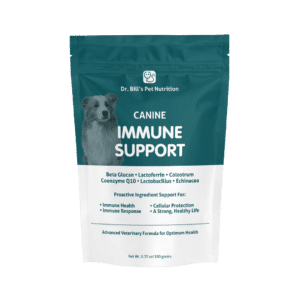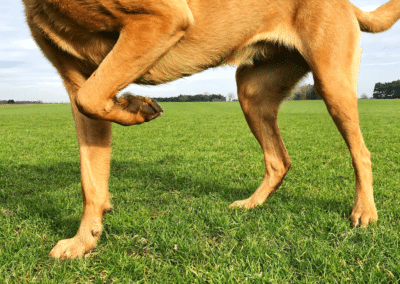Once identified, autoimmune diseases should be treated by a veterinarian as they can be life threatening to your dog. Similar to type 1 diabetes in humans, autoimmune diseases in canines occur when their immune system mistakenly attacks normal body tissue due to thinking its foreign cell tissue. We’re going to list some of the most common autoimmune diseases, symptoms to watch out for, and how best to prevent your dog from experiencing these uncomfortable and often painful conditions.
Common Autoimmune Diseases
A canine’s immune system is a complicated network of white blood cells, antibodies, and other defenses that fight off infections, viruses, bacteria, and other foreign substances. While autoimmune diseases involve several disorders that affect a dog’s immune system, all of these diseases cause the immune system to attack its own body. Treatment options and symptoms vary depending on which specific tissue or organ is impacted, making diagnosis a bit more difficult than other canine health conditions. Common autoimmune diseases in dogs include:
- Pemphigus Complex – Roughly one-third of all canine autoimmune disorders are Pemphigus, making it the most common canine autoimmune disease. There are five types of pemphigus, although all of them attack the connections between skin cells.
- Pemphigus Foliaceus (PF) – The most common type of pemphigus found in dogs. Symptoms include scabs and ulcers around the affected canine’s eyes, ears, footpads, groin, and bridge of their nose.
- Pemphigus Vulgaris (PV) – While this is the most common type of pemphigus found in humans, it’s fortunately rarely found in dogs. When suffering from PV, affected individuals will form blisters around their lips, eyes, nostrils, and other sensitive regions.
- Pemphigus Erythematosus (PE) – The most common symptoms of PE are redness, crusting, scales, and hair loss in the affected area.
- Pemphigus Vegetans (PV) – Rarely found in dogs, PV is evident when irregular lesions and lumps are found pulsating on the skin of the affected area.
- Paraneoplastic Pemphigus (PNP) – This condition is associated with the presence of a malignant tumor. Fortunately, PNP is extremely rare in canines.
- Systemic Lupus Erythematous (SLE) – A rare and severe form of lupus that can be fatal to the affected dog. SLE impacts the dog’s immune system so that it attacks their skin, blood, nervous system, and various major internal organs. Diagnosing canine’s with SLE can be difficult due to these symptoms mimicking other diseases, although fevers, lethargy, seizures, muscle pain, stiffness, hair loss, and skin lesions are all common canine signs of SLE. Unfortunately, there is no cure for SLE, so most professional treatments include merely reducing these painful symptoms.
- Discoid Lupus Erythematosus (DLE) – This is the more common and less severe form of canine lupus that only affects their skin. Treating DLE focuses on healing the affected area with steroids, antibiotics, or other essential supplements. DLE symptoms to watch out for include sores, ulcers, scarring, itchiness, scratching, and skin redness.
- Autoimmune Hemolytic Anemia (AHA) – AHA occurs when a dog’s immune system attacks their body’s red blood cells. While red blood cells are responsible for supplying oxygen from the lungs to all body tissues, AHA destroys these red blood cells faster than they can be replaced. Symptoms to watch out for include weakness, weight loss, increased breathing, fever, and discoloration of the eyes, gums, and skin.
- Immune Mediated Thrombocytopenia (ITP) – ITP occurs when a canine’s immune system attacks the cells responsible for forming blood clots. While symptoms of ITP are rarely seen under most circumstances, affected dog’s conditions can rapidly worsen if they sustain an open wound. Symptoms of ITP includes bruising, excessive bleeding following an injury, or blood in their urine or stool.
- Hypothyroidism – Damage to a dog’s thyroid due to autoimmune thyroiditis is one of the biggest causes of canine hypothyroidism. This occurs when a dog’s autoimmune system develops antibodies that attacks the thyroid, resulting in bodily damage and impaired function. Common symptoms of canine hypothyroidism include lethargy, obesity, mental dullness, and exercise issues.
While autoimmune diseases in dogs are fortunately uncommon, they do occur. Peculiarly, causes of autoimmune disease are not fully understood by professionals, although many theorize that genetics and environmental pollutants play vital roles. One of the most common beliefs held by veterinarians is that ultraviolet (UV) light can be a harmful element that triggers canine autoimmune diseases. Additionally, certain drugs are thought to worsen common forms of autoimmune diseases. Either way, these unclear theories can make it difficult to diagnose and treat canines suffering from these painful conditions. In any case, early recognition is incredibly important as, if left untreated, autoimmune diseases can be serious and fatal to your four-legged friend.
Protect Your Dog from Autoimmune Diseases
The Innate Immune System is your dog’s first line of defense against foreign intruders like parasites, bacteria, viruses, yeast, fungus, mold, and other cancer-causing agents. When their system is functioning properly, it recognizes these foreign intruders and dispatches T-cells to destroy them. Primary defense cells require an optimum level of protein along with certain vitamins and minerals such as vitamins A, C, E, and B, as well as the minerals copper, zinc, manganese, and iron to function properly. Other members of the innate immune system that assist in this process include macrophages and neutrophils, which engulf, digest, and kill the intruders.
Biologically appropriate and healthy nutrition is incredibly important to prevent your dog from suffering the painful conditions of these various autoimmune diseases. Protein quality is important in maintaining the body’s natural defenses. Protein deficiencies resulting from diet, prolonged disease or high levels of stress remove an animal’s ability to naturally fight off disease and protect themselves. Micronutrients such as vitamins, minerals, and related cofactors support the immune system.
Dr. Bill’s Canine Immune Support is a delicious nutritional powder containing a potent blend of 17 immune enhancing ingredients to bolster your pet’s natural immune response and support the innate immune system in its daily fight against disease producing organisms. Immune Support provides added protection by enhancing the ability of your pet’s innate immune system to detect, track, and kill invading organisms. Giving your pet a pill can be challenging, that’s why most of our supplements are formulated as a power that can be sprinkled dry onto any diet or moistened to make a tasty, nutritious broth. It’s easy and dog’s love the flavor!
-
Canine Immune Support$37.70 — or subscribe and save 10%










0 Comments